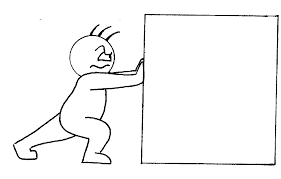push
英 [pʊʃ]
美 [pʊʃ]
- vt. 推动,增加;对…施加压力,逼迫;按;说服
- vi. 推进;增加;努力争取
- n. 推,决心;大规模攻势;矢志的追求
使用频率:

记忆方法
1、puls- "drive, push" => push.
中文词源
push 推,推动,推进
来自古法语poulser,推动,推进,来自拉丁语pulsare,击,打,推进,词源同pulse,propel.字母l脱落。
英语词源
- push
-
push: [13] Push comes ultimately from the same source as English pulsate and pulse – pulsus, the past participle of Latin pellere ‘drive, push, beat’. From it was formed the verb pulsāre ‘push, beat’, which in Old French became poulser, later pousser. Anglo-Norman took this over as *pusser, and passed it on to English as push.
=> pulsate, pulse - push (v.)
- early 14c., from Old French poulser (Modern French pousser), from Latin pulsare "to beat, strike, push," frequentative of pellere (past participle pulsus) "to push, drive, beat" (see pulse (n.1)). Meaning "promote" is from 1714; meaning "approach a certain age" is from 1937. For palatization of -s-, OED compares brush (n.1); quash. Related: Pushed; pushing.
"Pushing up the daisies now," said a soldier of his dead comrade. ["The American Florist," vol. XLVIII, No. 1504, March 31, 1917]
To push (someone) around is from 1923. To push (one's) luck is from 1754. To push the envelope in figurative sense is late 1980s. To push up daisies "be dead and buried" is from World War I. - push (n.)
- 1560s, from push (v.). Phrase push comes to shove is from 1936.
权威例句
- 1. I saw her push the boulder down on you.
- 我看见她将巨石推下砸向你。
- 2. Information is called up at the push of a button.
- 按一个键信息就会被调出来。
- 3. The new Chancellor has the guts to push through unpopular tax increases.
- 新总理有勇气推动不受欢迎的增税方案获得通过。
- 4. The vote will enable the Prime Minister to push through tough policies.
- 这次投票将使首相能够力行强硬政策。
- 5. We need a push to take the first step.
- 我们需要一点儿鼓励才能迈出第一步。
